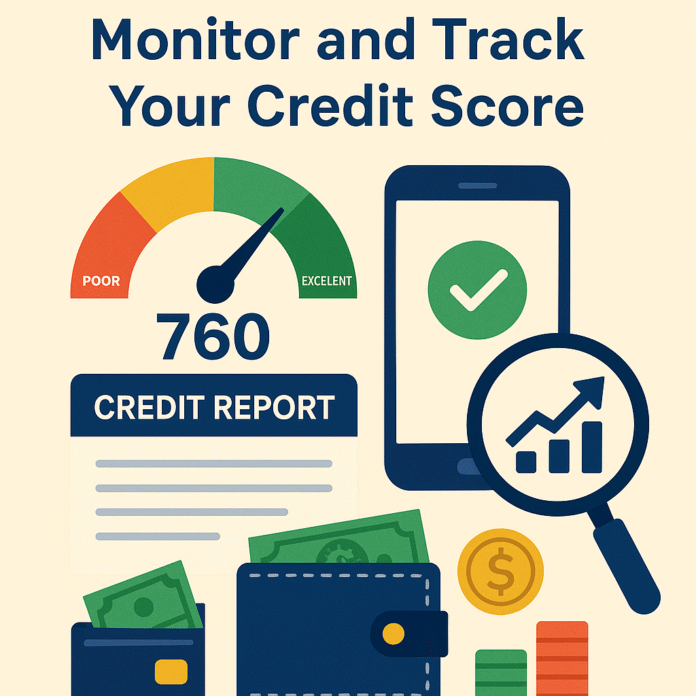Having a good credit score is very important in today’s money world. Landlords and lenders often look at your credit score to see if you’re a good risk when you want to rent an apartment, get a mortgage, or borrow money. Having a good credit score not only helps you get better loan terms and interest rates, but it also gives you more power to negotiate in many other financial situations. On the other hand, your credit score changes all the time because of what you do, the risk of identity theft, mistakes in reporting, and changes in how credit is calculated. You should check your credit score often and keep an eye on it so you can find problems early, know what hurts your score, and fix them right away.
This in-depth guide lists the Top 5 Ways to Keep an Eye on Your Credit Score, as well as other good habits and step-by-step instructions on how to protect and improve your credit profile. Many people who write about credit know how to deal with it.
Why you should check your credit score often and keep an eye on it
Finding mistakes and fraud early on
There are times when credit reports are wrong. For example, they could spell your name wrong or say you have accounts that you never opened. If you don’t check your score often, these kinds of mistakes can lower it for months without you even knowing it. It’s even worse when criminals make up fake charges using your name. In 2022, 3.1% of people in the U.S. had their identities stolen. Victims lost an average of more than $1,000.
How to Find Out What Affects Your Score
Your credit score is based on four things: how much credit you have (10%), how long you’ve had credit (15%), how much credit you use (30%), and how many new credit inquiries you make (10%). Checking your score often will show you how things like closing a credit card or having a high balance affect it.
Getting the best rates on loans and mortgages
You could save thousands of dollars over the life of a loan if your credit score goes up even a little bit. Your 30-year fixed mortgage rate could drop by as much as 0.25% if your FICO score goes from 720 to 760. You could save more than $15,000 on a loan of $300,000.
Getting your finances in order
If you check your score often, it will help you keep your credit in good shape. You can see how your credit score changes right away when you pay your bills on time or use a lot of credit. This makes it easier to do things like not applying for credit when you don’t need it, paying your bills on time, and keeping your balances low.
Five great ways to check your credit score and keep an eye on it
1. Hire a well-known company to keep an eye on your credit.
Credit monitoring services look at your credit report and score for you. They let you know when you open a new account, ask for a hard inquiry, or change your balance.
Things to Be Careful About:
- You will get an alert right away if someone asks a question, opens a new account, or changes your personal information.
- You’ll get updates on your scores every month, along with an explanation of why they change.
- Checking the dark web to see if your phone number, email address, or Social Security number is in stolen data dumps.
- If someone steals your identity, this insurance will pay for your legal and recovery costs.
- Experian, TransUnion, and Equifax all offer some kind of protection. You can check on all three of them to make sure everything is going well.
The best businesses are:
- Karma for Credit (free; checks on Equifax and TransUnion)
- myFICO (paid; official FICO scores from all three credit bureaus)
- Identity Guard (paid; uses AI to watch the dark web and send alerts)
How to sign up:
- Pick a provider that can meet your monitoring needs and is within your price range.
- You need to give them your name, address, and Social Security number to open an account.
- Tell people who you are in more than one way.
- You can get alerts on your phone, email, or mobile app.
Things that are good:
- Quickly noticing odd behavior.
- There are clear reasons why scores go up and down.
- You can relax because someone is always watching out for you.
2. Every year, you can get a free copy of your credit report.
What it is: The law says you can get one free credit report from each bureau every year. AnnualCreditReport.com is where you can do this. Some bureaus gave out free reports more often during certain times, like the COVID-19 pandemic.
How to Get Reports:
- The only place to get free federal credit reports is AnnualCreditReport.com.
- Get reports from TransUnion, Experian, and Equifax.
- Answer questions about yourself, such as where you used to live and how much money you owe.
- Make a PDF file for every report.
Things to think about:
- Check to see that your name, address, and work history are all correct.
- Account Listings: Make sure that all of the accounts listed are yours and that the balances and payment histories are correct.
- Questions: Look for questions that are “hard” and that you don’t know the answer to. Your score will go down if you have too many of these.
- Look in public records for liens, judgments, or bankruptcies that shouldn’t be there.
Mistakes in Dispute Right Away: If you see mistakes:
- You can file a complaint on the websites of Equifax, Experian, and TransUnion.
- You need to show proof of who you are and your account statements.
- You should check on it often because the bureaus have 30 days to look into it.
- Check that the changes are correct, and then ask for new reports to make sure the problem is fixed.
3. Tell your bank or credit card company to let you know when your credit score goes up or down.
As part of their online banking services, a lot of banks now let you check your credit score and get alerts for free. These might only do a “soft” credit pull, which won’t hurt your score, but they’re a quick way to keep track of things.
A lot of people get these alerts:
- Your credit score changes every month or every three months.
- Balance thresholds let you know when your card balance goes over a certain amount, like 30% of its limit.
- Pay on time so you don’t have to pay late.
- Alerts for transactions that look strange and could be signs of fraud.
How to turn it on:
- You can log in using your mobile app or your online bank account.
- You should be able to find the credit monitoring or alert settings under “Account Services” or “Tools.”
- You can choose what kinds of alerts you want and get updates on your score.
- Know how to get in touch (by email or text) and how often.
Why Should Your Bank Text You?
- Convenience: It’s already part of the services you use.
- These services are cheap because a lot of banks give them away for free.
- Timely reminders: They make it less likely that you’ll forget to pay, which could hurt your score.
4. Apps and spreadsheets can help you keep track of your money.
Dedicated credit services have a lot of great features, but some people like to keep track of their money with personal finance apps or spreadsheets they make themselves. You can completely control how you look at and think about your credit-related numbers with these methods.
a. Some popular apps that help you keep track of your money are:
- Mint lets you see your budget, spending, and credit score all in one place.
- You Need A Budget (YNAB) is a tool that helps you create a budget from the ground up. It also checks your balances to see how much credit you still have.
- You can use the app Personal Capital to keep track of your investments and credit score.
Pros:
- You can see the whole picture by looking at your credit score, your budgets, your investments, and your net worth.
- Reports that can be changed: Graphs can help you see how things have changed over time.
- You can check your credit health anytime and from anywhere.
b. You can make your own spreadsheets
A spreadsheet can help you keep track of a lot of things if you want to be in charge of them.
- Write down the date, the bureau (Equifax, Experian, or TransUnion), the credit score, the usage rate, the account balances, and any notes you want to make in a different column.
- Monthly Data Log: Write down the score you got from each report or service every month.
- You can use the LINEST and TREND functions in the spreadsheet to see patterns and make good guesses about what your scores will be in the future.
- Think about it: Make a graph over time to see how things like paying off debt change your score.
The best ways to get things done are:
- Whenever you can, use APIs or CSV exports to make it easier to enter data.
- To keep your spreadsheet safe and have a backup, save it to the cloud.
- To protect your personal information, use passwords and two-factor authentication.
5. Talk to a credit counselor or financial advisor.
Getting help from a professional can be very helpful if you have a lot of debt, are trying to get back on your feet after bankruptcy, or have made a lot of mistakes in your reports. Certified credit counselors and financial advisors can help you make plans that work for you. They only charge fees.
How to Find Good Workers:
- The National Foundation for Credit Counseling (NFCC) has a group of certified credit counselors who don’t charge anything.
- The Financial Planning Association (FPA) can help you find advisors who only charge fees and follow the rules for fiduciaries.
- CPAs are good at handling money.
What to Look Forward To:
- A full credit check looks at your credit history and the credit histories of other people.
- Individualized action plans, like plans for managing debt, talking to creditors, or specific ways to settle disagreements.
- It’s helpful to have regular check-ins, learning materials, and be held accountable.
Things to remember about price:
- Not-for-profit credit counseling services often have sliding scales or free services.
- Most of the time, advisors who only charge fees charge by the hour (between $100 and $300) or a set amount for a whole plan.
More tips on how to manage your credit well
The five best ways to keep an eye on your credit are the most important parts of a good plan for doing so. You might also want to think about doing these things:
Stop Your Credit
You can freeze your credit with the three bureaus if you notice something strange or think your identity has been stolen. This will keep people from making new accounts in your name. You can easily unfreeze when you need to.
Add reminders to your calendar.
A week before your credit card payments are due, set reminders on your digital calendar, such as Google Calendar or Outlook. You could lose 25 to 100 points if you don’t pay on time.
Different kinds of credit
Your score could go up by as much as 10% if you have a good mix of credit cards, auto loans, mortgages, and installment loans. But don’t borrow more money just because of this.
Limit Hard Questions
If you want to know your score quickly (within 14 to 45 days), that counts as one inquiry for scoring models like FICO’s newest ones. If you get a hard pull outside of this time frame, your score could go down by a few points.
Don’t close old accounts.
Your accounts’ ages add to your credit history, even if you don’t use them very often. If there is a yearly fee, don’t just close the account. Instead, call the issuer and ask them to either keep your account open or get rid of the fees.
Questions and Answers (FAQs)
Question 1: How often should I look at my credit score? You can check your credit score for free at least once a month on your bank’s website or through a free service. You should also get a full credit report from each bureau once a year at AnnualCreditReport.com.
Q2: Will looking at my own score hurt my credit? These are “soft inquiries,” which means they don’t affect your score. It can only go down for a short time if you make a “hard inquiry,” like asking for a loan.
Q3: I saw a mistake on my credit report. How can I fix it the quickest? Send the bureau an online complaint that tells them what they did wrong. Do all the paperwork that needs to be done, and then come back in a month. You can also get a quicker answer by talking to the creditor directly.
Q4: Is it worth it to pay for services that check your credit? Paid services include things like insurance against identity theft, monitoring from all three bureaus, and more detailed alerts. The extra security and recovery are worth the money ($15–30/month) if you’re at higher risk, like if someone stole your data.
Q5: Can a credit counselor help me improve my score? A licensed counselor can talk to your creditors, help you come up with a plan to pay off your debts, and teach you how to make a budget. They can’t promise a quick score boost, but their methods usually work in the long run.
Q6: How long will the wrong information stay on my credit report? Most bad things, like missed payments and collections, stay on your record for seven years after you miss your first payment. Bankruptcies can stay on your record for seven to ten years, depending on the chapter.
In short
Checking your credit score and keeping an eye on it can help you find mistakes, keep your identity safe, and make smart choices that are good for your money. Using free yearly reports, credit monitoring services, bank alerts, personal finance tools, and professional advice, you can keep your credit profile accurate and up to date. These tips, along with good habits like freezing your credit, setting calendar reminders, and keeping track of inquiries, will help you keep your credit in good shape for a long time.
Your credit score isn’t a set number; it’s a record of how well you’ve managed your money in the past. Stay on top of things and use these five tips to help you make a good plan for keeping track of your credit. The peace of mind, the dream home, and the good loan terms that come with it will make your future self happy.
References
- Federal Trade Commission. “Identity Theft Study 2022.” FTC, 2022. https://www.ftc.gov/news-events/data-visualizations/privacy-protections/identity-theft-study-2022
- FICO. “Credit Education: What Makes Up Your FICO® Scores?” myFICO. https://www.myfico.com/credit-education/credit-scores
- Consumer Financial Protection Bureau. “What Does My Credit Score Mean?” CFPB. https://www.consumerfinance.gov/ask-cfpb/what-does-my-credit-score-mean-en-315/
- AnnualCreditReport.com. “Request Your Free Credit Reports.” AnnualCreditReport.com. https://www.annualcreditreport.com
- Experian. “How Late Payments Impact Your Credit Score.” Experian. https://www.experian.com/blogs/ask-experian/how-late-payments-impact-credit-score/
- FICO. “Rate Shopping and Credit Score Impact.” FICO Blog. https://www.fico.com/blogs/rate-shopping-and-credit-score
- Federal Trade Commission. “Free Credit Reports.” FTC Consumer Information. https://www.consumer.ftc.gov/articles/free-credit-reports
- Credit Karma. “Credit Monitoring & Credit Score.” Credit Karma. https://www.creditkarma.com
- Identity Guard. “Credit Monitoring & Identity Theft Protection.” Identity Guard. https://www.identityguard.com
- National Foundation for Credit Counseling. “Find a Credit Counselor.” NFCC. https://www.nfcc.org






